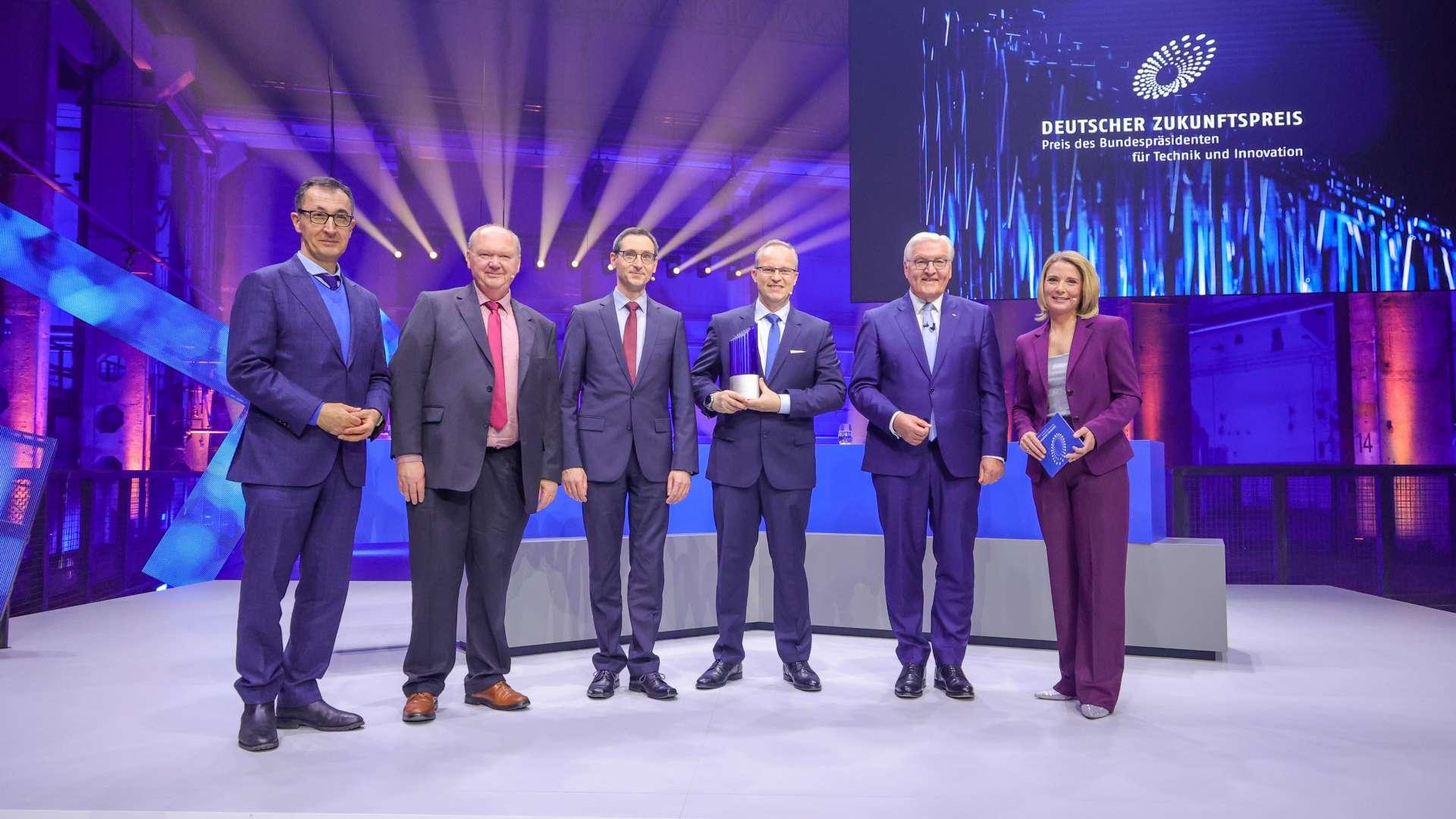Germany’s President Frank-Walter Steinmeier honoured the winners of the Deutscher Zukunftspreis 2024 at a formal ceremony in Berlin. The award was presented to a team of experts led by Dr Norwin von Malm and Stefan Grötsch from ams OSRAM and Dr Hermann Oppermann from the Fraunhofer Institute for Reliability and Microintegration IZM for the technological implementation of their idea — an LED matrix that turns car headlights into projectors. The LED technology developed by the team opens up new possibilities for innovative designs thanks to its high-resolution light distribution and energy efficiency.
As part of their Digital Light project, the researchers and their teams have completely rethought intelligent LED technology and established a basic technology that enables numerous new applications, even beyond car headlights. Dr Norwin von Malm and Stefan Grötsch from ams OSRAM and Dr Hermann Oppermann from Fraunhofer IZM have developed a light source that is smaller, lighter, more efficient, more intelligent and more precise in its light output than conventional light sources. The new system will allow car headlights, for example, to illuminate the road ahead precisely and brightly without blinding or endangering oncoming traffic or pedestrians. A conventional low-beam/high-beam combination is not an option here because it must be possible to control the light’s spatial distribution and for the light itself to adapt to the respective situation. To achieve this, the new headlight does not use two light sources like conventional headlights. Instead, it relies on 25,600 LEDs in a matrix of 320 x 80 points, where each individual LED can be controlled with a digital signal. In combination with a special lens, this creates a headlight that works much like a video projector.
Compact design and high efficiency
The new system requires minimal installation space and is highly efficient since only the LEDs that are actually required for the desired light distribution are switched on. Systems with passive light modulation, by contrast, rely on shading, meaning that the light source is always on at full power, and the undesired light is filtered back out. However, this is an inefficient solution, since it involves generating unnecessary light. Furthermore, the generated heat must be dissipated, which requires large and expensive cooling systems. The new system prevents these losses from occurring in the first place.
Increased safety through projected pictograms
To increase safety, ams OSRAM and Fraunhofer have come up with something special: Their headlight not only provides precise and efficient light for the road ahead; it also acts as a projector and can project pictograms onto the road, e.g., a snowflake if there is a risk of frost or a specific symbol for wrong-way drivers.
Digital Light — intelligent LED technology for the world of tomorrow
Light-based information opens up many new use cases for the team’s LED matrix, which can be controlled via a digital system. Examples include optical data communication between computer chips, e.g., in data centres for AI applications, or augmented reality (AR). Here, the light matrix could be used as a virtual monitor for AR glasses, where digital information is displayed in the user’s field of vision in addition to the real-world environment. A compact design and energy efficiency are essential here since AR glasses must be lightweight and have a long battery life. These use cases demonstrate the enormous potential of Digital Light when it comes to transforming the ways humans and electronic devices interact.
Deutscher Zukunftspreis — paying tribute to innovative achievements in engineering and science
“I extend my best wishes to the teams led by Dr Norwin von Malm and Stefan Grötsch as well as to Fraunhofer IZM on this outstanding award. Receiving the German President’s Deutscher Zukunftspreis for our intelligent LED solution Digital Light, after a first award in 2007, is a special distinction for the entire Fraunhofer-Gesellschaft. The award demonstrates the enormous innovative strength of ams OSRAM and underlines the importance of intelligent lighting and sensor technologies for our digital society of today and tomorrow,” said Aldo Kamper, CEO of ams OSRAM.
“My sincere congratulations to the winning team from ams OSRAM and Fraunhofer IZM on this great award,” said Prof Hanselka, President of the Fraunhofer-Gesellschaft. “As part of their Digital Light project, the researchers have done more than develop a groundbreaking technology that opens up new possibilities for efficiency, safety and design. They have also provided a first-class example of the innovative strength that comes with transferring cutting-edge scientific findings to practical applications through the collaboration between research and industry. The Fraunhofer IZM team has clearly demonstrated the dedication, creativity, pioneering research and entrepreneurial spirit that characterizes the Fraunhofer-Gesellschaft and forms the basis of our success. Being awarded the Deutscher Zukunftspreis is a great success for the whole team and shows the extraordinary work that has gone into this project.”
Awarded annually since 1997, the Deutscher Zukunftspreis is one of the most prestigious accolades for scientific achievement in Germany and includes 250,000 euros in prize money. It celebrates outstanding achievements in the fields of technology, engineering, and science that result in products that are ready for applied use. Each year, a prestigious jury goes through a multi-stage process to select three research teams and their innovative idea from a wide range of projects. These three teams proceed to the final round, the “circle of the best.” In addition to innovation, the jury also evaluates the economic and social potential of the project. This is the tenth time that Fraunhofer has been awarded the Deutscher Zukunftspreis, with Fraunhofer IZM receiving the prize for the first time.
Caption: The winners of the Deutscher Zukunftspreises 2024, Dr Norwin von Mal (centre), Stefan Grötsch (third from right) and Dr Hermann Oppermann (second from left) with Federal President Frank-Walter Steinmeier (second from right), Federal Minister for Education and Research Cem Özdemir (left) and moderator Yve Fehring (right)


